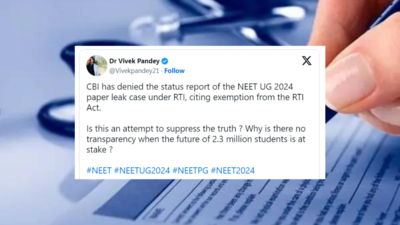
NEW DELHI: In a recent development in the NEET UG 2024 paper leak case, the Central Bureau of Investigation (CBI) has filed a second charge sheet before the Patna Special Court for CBI cases, implicating six individuals in connection with the theft of the National Eligibility-cum-Entrance Test (Undergraduate) question paper.
While the investigation is progressing, the CBI recently rejected a Right to Information (RTI) request seeking details on the investigation, citing Section 24 of the RTI Act 2005 as the basis for denial.This rejection raises concerns on transparency and the limits of the agency’s exemption under the RTI Act.
The RTI Request and the CBI’s Response
Dr. Vivek Pandey, a physician and RTI activist, filed the RTI application on August 29, 2024, seeking detailed information on the status of the investigation into the NEET UG 2024 paper leak case. Dr. Pandey’s RTI request specifically sought:
- The current status of the investigation being conducted by the CBI.
- Information on arrests made, charges filed, and significant findings in the case.
- Details of any interim reports or updates submitted to higher authorities or the court regarding the investigation.
A copy of the final status report shared with TOI by the applicant is shown below.
CBI’s dodgy response citing exemption under Section 24 of the RTI act
In response, the CBI rejected the RTI application, citing Section 24 of the RTI Act 2005. According to the CBI’s response, the agency is exempt from disclosing such information under a government notification issued in 2011. The CBI also mentioned that the case is still under investigation, further justifying the denial of information.
The response letter, shared by Dr Vivek is shared below.
Understanding Section 24 of the RTI Act
Section 24 of the RTI Act 2005 exempts certain intelligence and security organisations from the purview of the Act. These organisations, listed in the Second Schedule of the Act, are not required to disclose information, except in cases involving allegations of corruption or human rights violations.
The exemption aims to protect sensitive operational details that may compromise national security or the integrity of ongoing investigations.
However, one can argue that such exemptions, if applied too broadly, can limit transparency and public accountability, especially in high-stakes cases like the NEET UG 2024 paper leak, where the public has a vested interest in understanding the progress of the investigation.
Delhi High Court’s Interpretation of CBI Exemption
The CBI’s exemption from the RTI Act is not absolute. In a landmark judgement, the Delhi High Court clarified the scope of Section 24. In a January 2024 ruling, Justice Subramonium Prasad highlighted that while the CBI is listed in the Second Schedule and thus exempt from disclosing certain information, the exemption does not apply in cases involving allegations of corruption or human rights violations.
This ruling came in response to a petition where the CBI had refused to provide information related to alleged corruption in medical purchases at AIIMS.
The court emphasised that the proviso to Section 24 allows for the disclosure of information related to corruption and human rights violations, even if the organisation is generally exempt under the Second Schedule. Therefore, while the CBI can refuse to disclose information in many cases, it cannot do so in instances where corruption or human rights violations are involved.
